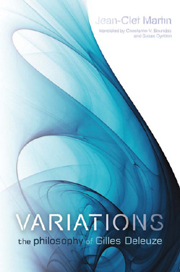Book contents
- Frontmatter
- Contents
- Letter-Preface by Gilles Deleuze
- Preambles
- First Variation: Ethics and Aesthetics
- Second Variation: Three Poetic Formulas for Nomadic Distribution
- Third Variation: Multiplicities
- Fourth Variation: Malcolm Lowry, or, the Manifesto of Things
- 1 The March Towards Death
- 2 Mannerisms
- 3 For a Microphysics of Qualities
- Postscript to the Anglo-American Edition: What is a Multiplicity?
- Notes
- Bibliography
- Index
3 - For a Microphysics of Qualities
from Fourth Variation: Malcolm Lowry, or, the Manifesto of Things
- Frontmatter
- Contents
- Letter-Preface by Gilles Deleuze
- Preambles
- First Variation: Ethics and Aesthetics
- Second Variation: Three Poetic Formulas for Nomadic Distribution
- Third Variation: Multiplicities
- Fourth Variation: Malcolm Lowry, or, the Manifesto of Things
- 1 The March Towards Death
- 2 Mannerisms
- 3 For a Microphysics of Qualities
- Postscript to the Anglo-American Edition: What is a Multiplicity?
- Notes
- Bibliography
- Index
Summary
We are indebted to Deleuze for his belief that Matter and Memory is a remarkable contribution to the history of philosophy – as first noted in one of his essays on Bergson and again in his monograph dedicated to cinema. Chapter 4 of The Movement-Image is given over to a vertiginous analysis of the Bergsonian universe and from this point of view establishes the matrix of the classification of signs and images in its entirety that Deleuze will develop in the rest of the book. This analysis of the Bergsonian universe is the site of a completely original physics of qualities, whose variable aspects one can discover in Deleuze's works. In Bergson, as we know, perception cannot be separated from a selective capacity. Generally, its role consists in eliminating from image and movement everything over which our actions have no hold or power; in other words, everything that escapes the sensory-motor schematism. In the fabric of images and things, our conscious perception draws a system that favours our possible action on the real, and this is why everything else escapes us. It is, as Bergson says, an infinitely divisible net that we cast over the continuity of the material world. Everything unfolds, therefore, as if we were content with filtering the real action of external things in order to occlude every virtual action.
Information
- Type
- Chapter
- Information
- VariationsThe Philosophy of Gilles Deleuze, pp. 205 - 214Publisher: Edinburgh University PressPrint publication year: 2010
